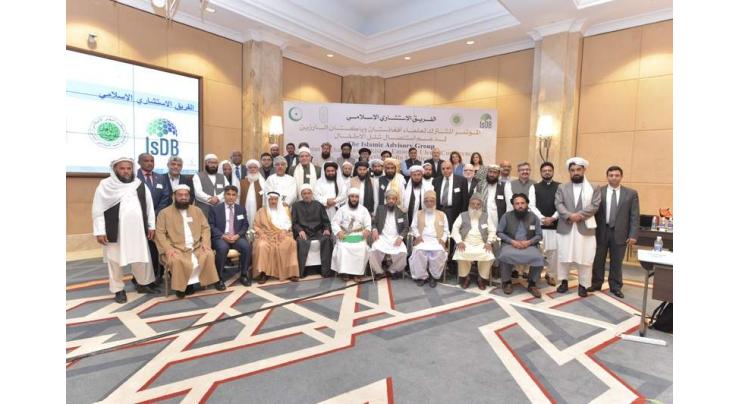
- Home
- Pakistan
- News
- OIC Participates in the Joint Afghanistan- Pakistan Eminent Ulema Conference for Supporting Polio Er ..
OIC Participates In The Joint Afghanistan- Pakistan Eminent Ulema Conference For Supporting Polio Eradication
Umer Jamshaid Published April 15, 2019 | 09:34 PM

The Joint Afghanistan-Pakistan Eminent Ulema Conference opened in Muscat, Sultanate of Oman today under the auspices of the Ministry of Health of Sultanate of Oman and the Islamic Advisory Group for Polio Eradication (IAG).The Conference is aimed at supporting efforts towards protecting children and to enhance cross-border cooperation in accessing children with vaccination
Muscat (UrduPoint / Pakistan Point News - 15th Apr, 2019 ) The Joint Afghanistan-Pakistan Eminent Ulema Conference opened in Muscat, Sultanate of Oman today under the auspices of the Ministry of Health of Sultanate of Oman and the Islamic Advisory Group for Polio Eradication (IAG).The Conference is aimed at supporting efforts towards protecting children and to enhance cross-border cooperation in accessing children with vaccination.
The Conference takes place in implementation of the decisionof the 5th IAG Meeting held at the OIC General Secretariat on 14 November 2018. Today’s Conference was attended by 20 Eminent Ulema from Afghanistan and Pakistan.
It was also attended by Members of IAG members including representatives of the Grand Sheikh of Al-Azhar Al-Sharif;the OIC Secretary General; and the President of Islamic Development Bank Group (IsDB).
TheRegional Director of World Health Organisation East Mediterranean Regional Office (WHO) and representatives of United Nations Children's Fund (UNICEF) also participated. In his remarks,the Regional Director of WHO/EMRO Dr.
Ahmed Al-Mandhari commended the role of OIC Secretary General and other partners in the IAG in supporting global efforts for polio eradication in particular and the promotion of health and well-being of the people in the OIC Member States in general.
The representative of the OIC Mr. Abdunur M. Sekindi underscored the commitment of the OIC leadership tobuilding on the successful experience in improving polio immunization services to promote health care in the Member States which still carry a heavy burden of preventable causes of mortality and morbidity of children in line with the OIC Strategic Health Programme of Action (SHPA) 2014-2023.
In the declaration of the Conference, the Ulemasunderlined that vaccinating children is a moral and religious obligation and that preventing even a single child from being vaccinated is serious deviation from this important collective obligation as Prophet Muhammad, peace be upon him, said "It is sin enough for one to cause the loss of whom he feeds." Polio is a virus that has paralyzed and killed mostly children for thousands of years.
At the World Health Assembly in 1988, Ministers of Health of the member states set the goal to eradicate the disease at a time when the number of polio cases was estimated to be at 350,000 in 125 countries.
Today polio is at its lowest point in history, with only 9 cases reported so far in 2019, with 6 in Pakistan and 3 in Afghanistan. This represents a decrease by over 99.9% from 1988. But eradicating polio from these last remaining strongholds has proven to be a challenge requiring the exertion of special efforts by all partners involved.
Once successful, the eradication of polio will be only the second time in history that a communicable disease is eradicated from the world through human effort. The first success came with smallpox which was declared eradicated in 1980 after a global vaccination campaign led by WHO.
Unlike most other diseases, polio can be eradicated because it is not transmitted by vector, infects only humans, does not survive long in the environment, and a safe and effective vaccine is available.
Related Topics
Recent Stories

PTI to stage nationwide protests against alleged electoral frauds

Senate continues discussion on Presidential address to Joint Sitting of Parliame ..

Masood Khan calls for Pak-US cooperation for regional peace

Interior Minister starts Margalla Trail Patrol for security

Currency Rate In Pakistan - Dollar, Euro, Pound, Riyal Rates On 26 April 2024

Today Gold Rate in Pakistan 26 April 2024

ICC Womens T20 World Cup Qualifier, Match 2: Ireland Women open with Comfortable ..

Robinson, bowlers help New Zealand go 2-1 up against Pakistan

Shahzeb Chachar to hold khuli kachehri on April 26

Heatwave amid Israel's aggression in Gaza brings new misery, disease risk

Tourism must change, mayor says as Venice launches entry fee

Court adjourns Judicial Complex attack case till May 17
More Stories From Pakistan
-
Passco continue operations to procure 75000 ton wheat in Burewala zone, says zonal head
1 minute ago -
Pak Chef attracts tourists through traditional cuisines at cooking competition
2 minutes ago -
World Earth Day observed in Sukkur
2 minutes ago -
JICA delegation visits Education Secretariat South Punjab
2 minutes ago -
NH&MP conducts road safety awareness seminar for students
2 minutes ago -
Lahore-Paris rally to highlight the positive image of Pakistan; Rana Mashhood
2 minutes ago
-
UK higher Education leaders visit CUI
2 minutes ago -
DPO inaugurates blood donation camp
2 minutes ago -
9th class student stabbed in Kohat
2 minutes ago -
Pak Chef attracts tourists through traditional cuisines at cooking competition
12 minutes ago -
Lahore police conducted 1,213 search & combing operations this year
12 minutes ago -
Inimical forces impeding Pakistan's development to be failed with nation's support: COAS
22 minutes ago